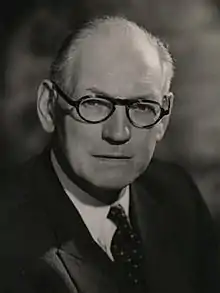The Lord Fletcher | |
|---|---|
 Fletcher, c. 1965 | |
| Minister without portfolio | |
| In office 1964–1966 | |
| Leader | Harold Wilson |
| Member of Parliament for Islington East | |
| In office 5 July 1945 – 29 May 1970 | |
| Preceded by | Thelma Cazalet-Keir |
| Succeeded by | John Grant |
| Personal details | |
| Born | Eric George Molyneux Fletcher 26 March 1903 |
| Died | 9 June 1990 (aged 87) |
| Nationality | British |
| Political party | Labour |
| Alma mater | Radley College University of London |
Eric George Molyneux Fletcher, Baron Fletcher, Kt, PC, FSA, FRHistS (26 March 1903 – 9 June 1990) was a Labour Party politician in the United Kingdom.
Personal life
Fletcher was the eldest of three children of Clarence George Eugene Fletcher (1875-1929), CBE,[1] of Oak Lodge, Bycullah Road, Enfield, London, a barrister and town clerk of Islington, formerly town clerk of Bethnal Green, and, as a recognized authority on the subject, a member of the Advisory Committee set up by the Home Office on registration of electors and conduct of elections,[2][3] and Nellie Molyneux, formerly of Tooting.[4][5][6] He had a brother, Dr (Clarence) John Molyneux Fletcher (father of the historian Anthony Fletcher), and sister, Ena. His paternal grandfather, George Fletcher, was a member of the Metropolitan Police Force attached to the Fulham Division.[7][8] He studied at Radley College and the University of London and became a solicitor, specialising in international law. He was deputy chairman of the Associated British Picture Corporation.
Political life
Fletcher was elected onto the London County Council for Islington South, serving 1934–49. At the 1945 general election, he was elected as Member of Parliament (MP) for Islington East, defeating the Conservative Party feminist MP Thelma Cazalet-Keir. In Harold Wilson's first government, he served from 1964 to 1966 as Minister without Portfolio, House of Commons spokesman for the Lord Chancellor's Department and then Deputy Speaker.
Fletcher was knighted in 1964,[9] and appointed to the Privy Council in 1967. On 9 July 1970, he was created a life peer as Baron Fletcher, of Islington in Greater London.[10]
Other work
Fletcher served as a member of the Church Assembly of the Church of England in 1962. He was a member of the Senate of the University of London, and a governor of Birkbeck College and the London School of Economics.
Fletcher was a member of the Royal Commission on Historical Manuscripts from 1966, a trustee of the British Museum between 1968 and 1977, and president of the British Archaeological Association from 1960 to 1963.[11]
Fletcher was a keen amateur historian of legal matter and archaeology. He was elected a Fellow of the Society of Antiquaries of London (FSA) in 1954, and was also a Fellow of the Royal Historical Society (FRHistS).[11]
Arms
 |
|
References
- ↑ https://www.thegazette.co.uk/London/issue/31840/supplement/3765/data.pdf; per his obituary in The Law Journal, this was awarded "for his work during the war in raising an Islington battalion, in connection with food rationing, and on the military tribunal"- The Law Journal, vol. 67, 1929, p. 172
- ↑ The Law Journal, vol. 67, 1929, p. 172
- ↑ The Solicitors' Journal, vol. 73, part 1, 1929, p. 141
- ↑ Debrett's Peerage, Baronetage, Knightage, and Companionage, Debrett's Ltd, 1973, p. 454
- ↑ Burke's Genealogical and Heraldic History of the Peerage, Baronetage and Knightage, Privy Council, and Order of Preference, Burke's Peerage Ltd, 1963, p. 113
- ↑ "C. G. E. Fletcher".
- ↑ Random Reminiscences of Lord Fletcher of Islington, Eric Fletcher, 1986, pp. 1, 6, 12
- ↑ Burke's Peerage and Baronetage, 106th edition, vol. 1, ed. Charles Mosley, Burke's Peerage Ltd, 1999, p. 126
- ↑ "No. 43501". The London Gazette. 27 November 1964. p. 10115.
- ↑ "No. 45147". The London Gazette. 10 July 1970. p. 7673.
- 1 2 "Fletcher, Baron, (Eric George Molyneux Fletcher)". Who Was Who. 1 December 2007. doi:10.1093/ww/9780199540884.013.U164205. ISBN 978-0-19-954089-1. Retrieved 15 May 2020.
- ↑ Debrett's Peerage. 1985. p. 460.
- The Times House of Commons 1955. 1955.
{{cite book}}:|work=ignored (help)
_(2022).svg.png.webp)